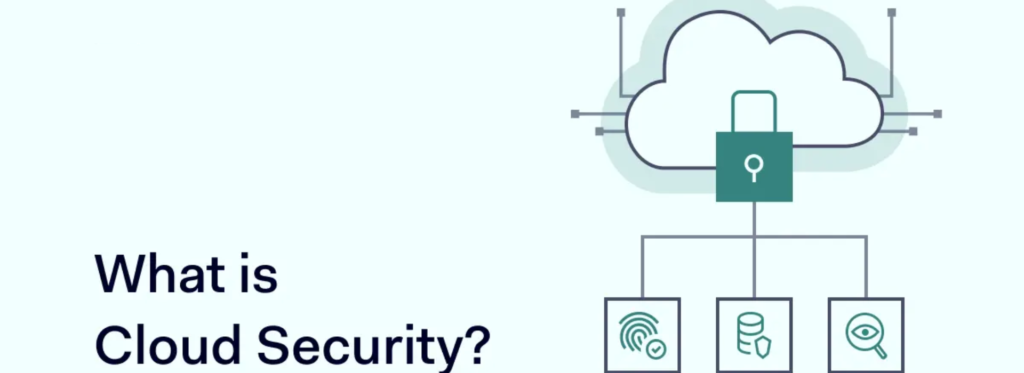
What is cloud security? Definition, types & benefits
Organizations of any size and across industries have the option to utilize cloud computing for storage, deployment of applications, and collaboration due to the rapid digitalization of the world. With these cloud-based features comes a greater need for cloud security. Be it a small company using cloud services for customers’ data or an industry giant using ERP systems like Tally on Cloud, a secured cloud infrastructure is essential.
In this blog, we will examine all the dimensions of cloud security, its different types, and also enlighten us on its primary contributions to contemporary businesses.
What is Cloud Security?
These are the various technologies, policies, and controls that are practiced to protect data, applications, and infrastructure that is hosted in the cloud.
Cloud security makes sure that both the service providers and the users are able to maintain the C-I-A of data irrespective of the type of cloud used. This can be public, private, or even hybrid.
Cevious knows how important cloud services are for running mission-critical applications like TallyPrime, and that’s why the best-in-breed enterprise cloud security solutions are deployed through our services.
Why is Cloud Security Important?
The cloud is susceptible to ransomware, data leaks, phishing, and insider threats. If not secured properly, the cloud becomes a potential target. A single lapse can lead to:
- Data theft or corruption
- Legal penalties for non-compliance
- Loss of customer trust
- Downtime and operational loss
Thus, cloud security is not merely an IT concern; rather, it is a critical business priority.
Security Models of the Cloud
Different types of cloud environments have different security requirements. Below is a summary of cloud deployment models and their respective cloud security considerations:
1. Public Cloud Security
- These are hosted by third-party providers such as AWS, Microsoft Azure, or Google Cloud.
- Cloud security is a shared concern between the provider and the client.
- This is suitable for businesses that are looking for cost-effective and scalable options.
- Stronger needs in access control, encryption, and identity management.
2. Private Cloud Security
- The infrastructure is dedicated to a single organization and could be on-premises or hosted.
- This allows for better control over security configurations, compliance, and overall governance.
- This is best suited for businesses that work with sensitive information, such as finance and healthcare.
- Custom security policies can be tailored more easily.
3. Hybrid Cloud Security
- Comprises both private and public cloud models.
- Needs secure mechanisms for transferring data between platforms.
- This enables businesses to keep critical data under their control but use the flexibility offered by the public cloud.
- Requires continuous monitoring, encryption, and access controls.
4. Multi-Cloud Security
- Derives services from several cloud vendors.
- Helps mitigate dependence on a single vendor and enhances resilience.
- Adds complexity to managing cloud security—standardized policies and centralized monitoring systems become more important.
Key elements of Cloud Security 8
Cloud Security is not a singular tool; it is an elaborate structure. Here are primary constituents:
1. Data Encryption
Sensitive data must be protected while in resting and active states with SSL, TLS, and AES. Unauthorized users must not have access to confidential data.
Identity and Access Management (IAM)
IAM policies define the boundaries of access within a cloud ecosystem. Critical components include RBAC (Role Based Access Control), MFA (Multi-Factor Authentication), and SSO (Single Sign-On).
3. Firewall and Intrusion Detection
Firewalls and intrusion detection and prevention systems (IDPs) for the cloud monitor data traffic for hazards such as suspicious activities and malware before any potential harm can be done.
4. Compliance Management
Both cloud providers and clients have to adhere to compliance such as ISO 27001, GDPR, HIPAA or India’s IT Act. Regular audits help ensure compliance.
5. Backup and Disaster Recovery
Cloud security encompasses preparing for worst-case scenarios. Regular data backups and automated disaster recovery protocols ensure operations can continue without interruption.
6. Monitoring & Threat Intelligence
AI-based monitoring tools should provide 24/7 surveillance of cloud environments to identify and mitigate risks instantaneously.
Benefits of Cloud Security for Businesses
Investing in robust cloud security like what Cevious offers with its Tally on Cloud, Cloud VPS, and other managed cloud services can greatly expand business capabilities for the following reasons:
1. Strengthened Protection & Privacy
Encryption coupled with access control prevents breaches. Internal, financial, and customer data can be safeguarded. Cevious ensures your Tally data and reports are always protected.
2. Regulatory Compliance
Effortlessly address data protection requirements. Helping businesses stay compliant and avoid unnecessary legal risks is one of our core capabilities.
3. Cost Efficiency
Defending against cyberattacks mitigates enormous recovery expenses. Cevious security management means no more full-time security personnel because the team will be protected at all times with scalable, round-the-clock coverage.
4. Business Continuity
Your operations can sustain minimal disruption even during system failures, cyberattacks, or outages as your data is backed up.
5. Trust and Credibility
Your clients have placed their trust in you, and a secure cloud setup protects the information, cures breaches, and builds long-standing trust.
6. Scalability with Security
There is no need to stress over new layers of security with the expansion of operations—Cevious enhances protective measures in line with increasing data sophistication.
How Cevious Safeguards Cloud Security
At Cevious, we prioritize security in all our cloud services:
- Secured Tally on Cloud with role-based access, firewalls, and automated backups.
- Geographically distributed servers for redundancy and high uptime.
- Managed Cloud VPS with real-time monitoring, patch management, and disaster recovery.
- Proactive block of suspicious activities with AI-based threat detection systems.
- Rapid response to security and performance issues with 24/7 expert support.
When you are utilizing TallyPrime, migrating to the cloud, or using custom enterprise applications, Cevious guarantees that your business operations are efficient and secure.
Conclusion
Cloud security is as vital as infrastructure protects customer data and prevents business disruption while enhancing risk management. It builds trust as a business asset, fostering customer confidence in seamless digital interactions.
With Cevious, you don’t just get cloud hosting—you get peace of mind. Businesses that value maximum uptime, protection, and future readiness, gain compliant and expertly managed cloud platforms tailored to their needs.




